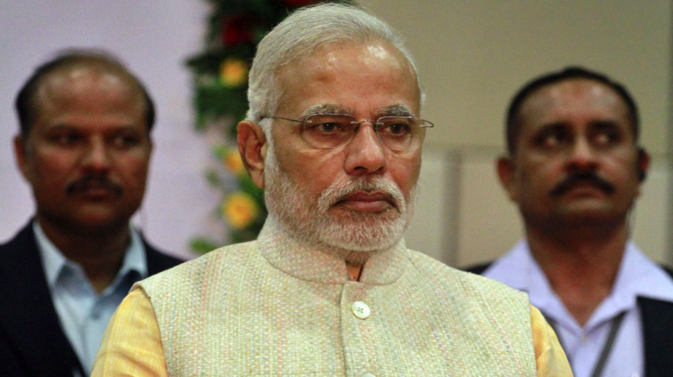
Modi played a key role in developing relations between Gujarat and Astrakhan. Source: AP
Prime Minister Narendra Modi is scheduled to arrive in Moscow on a two-day official visit for the 16th annual India-Russia summit dialogue with President Vladimir Putin on December 24-25. According to media reports, after the talks in Moscow, he may travel to Astrakhan, Russia’s gateway to the Caspian Sea, with its vast oil reserves and sturgeon stocks.
During his meeting with Putin, on the sidelines of the BRICS summit in July in Ufa, Modi expressed a desire to visit Astrakhan and even suggested the forthcoming India-Russia summit be held there. “If I have the chance to visit Astrakhan, I would like to do so, because when I was Chief Minister of my native state Gujarat, there were, and still are, fraternal relations between Gujarat and Astrakhan,” Modi said, of his earlier visits to Astrakhan city, which has established sister-city relations with Ahmedabad, Gujarat’s capital.
For over a decade, the Astrakhan Region has been working closely with Gujarat. The Region developed strong business ties with Gujarat during Modi’s tenure as Chief Minister, when he made his first official visit to Astrakhan in November 2001. He accompanied the then Prime Minister Atal Bihari Vajpayee to Moscow and signed a five-year MoU on cooperation between Gujarat State and Astrakhan Region, in the presence of Putin.
During his 13 years as Chief Minister, Modi played a key role in developing relations between Gujarat and Astrakhan. He was the first Indian chief minister to recognize the immense potential of an agreement signed during Putin’s visit to India in October 2000: “The Agreement between the Government of the Republic of India and the Government of the Russian Federation on the Principles of Cooperation between the Governments of States and Union Territories of the Republic of India and the Bodies of Executive Authority of the Constitutional Entities of the Russian Federation.”
Under the agreement, he chose to make Astrakhan Region as a sister-state of Gujarat. “We in Gujarat have the feeling that Astrakhan is very close to us,” he told Putin in Fortaleza (Brazil), during his first meeting with the Russian President after becoming PM, on the sidelines of the BRICS summit, in July 2014.
“While in Astrakhan, I visited a library and saw chronicles from India. It was a surprise to see these kinds of documents from India there. I had the feeling then that these two regions, Astrakhan and Gujarat, are very close to each other culturally,” he said.
“There is a building in Astrakhan called the Indian House. It turned out that in those days when merchants from Gujarat travelled to Astrakhan, this was the place where they stayed. Now the people of Astrakhan are very proud to show us how they have preserved and looked after this building,” Modi added.
Around two centuries ago, enterprising merchants and traders from Gujarat created a commercial hub in Astrakhan. They not only engaged in business activities, but also lived there and married local women and made it their new home. These old Gujarati links are what Modi has tried to renew since his first visit to Astrakhan in 2001.
After signing the first MoU in 2001, there have been several exchanges of business delegations between Gujarat and Astrakhan, to continuously intensify cooperation between them. As the cooperation developed, embracing ever-increasing numbers of areas, Modi visited Astrakhan in July 2006 for the second time, to sign a protocol to extend the MoU until November 2011.
With this protocol, Gujarat and Astrakhan started cooperation in five key areas, including hydrocarbons research and development, ship-building and ship-breaking, reviving the trade route along the North-South International Transport Corridor (NSITC) between Okha port in Gujarat and Olya port in Astrakhan through the Iranian rail-sea-road network, distance learning in university education, and a tourism package incorporating Astrakhan’s participation in the Gujarat’s Navratri and “Vibrant Gujarat” festivals. The two states also created a joint committee to oversee the business and trade component of the protocol.
As their relations developed, a delegation led by Astrakhan’s Vice-Governor Konstantin Markelov visited Gujarat in November 2011 to sign letters of extension of a protocol of cooperation to enhance trade, economic cooperation, joint ventures, and cultural exchanges.
A number of Gujarat-based companies have since signed MoUs in different fields, including oil and gas, shipbuilding, food processing, pharmaceuticals, fisheries, culture and education. Notable among them was the MoU between Russia’s Gazprom and Gujarat State Petroleum Corporation (GSPC). In February 2013, Ahmedabad-based Cadila Pharmaceuticals Ltd. signed an agreement to build a $150 million pharma manufacturing plant in Astrakhan.
In November 2014, the Indian Embassy in Moscow, jointly with the Astrakhan Government organized a presentation on opportunities and prospects for cooperation, led by Elina Polyanskaya, Vice-Chairman and Economic Development Minister of Astrakhan.
Indian ambassador to Russia, P. S. Raghavan, also emphasized the importance of Astrakhan in the activation of the North-South ITC, aimed at boosting the bilateral trade and economic activities due to its location on the banks of the Caspian Sea.
Earlier this year, Astrakhan Region’s Governor Alexander Zhilkin led a high-level official delegation to the biannual Vibrant Gujarat Global Investors Summit, in Gandhinagar. He also met Modi and discussed trade, economic and cultural cooperation between the states.
They discussed Zhilkin’s proposal to organize the Yoga Day in Astrakhan. Modi assured Zhilkin that necessary methodological assistance would be provided for the event. More than 1,500 Yoga enthusiasts participated in Yoga performances in Astrakhan on International Yoga Day on June 21.
All rights reserved by Rossiyskaya Gazeta.
Subscribe
to our newsletter!
Get the week's best stories straight to your inbox